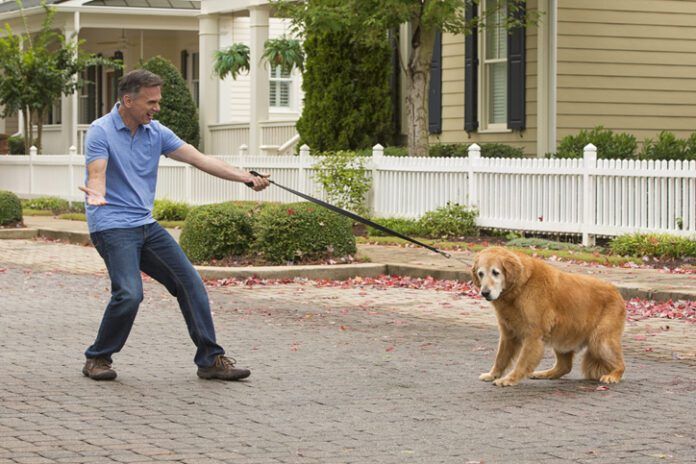
At a recent social event, an acquaintance who knows I have something to do with dogs said a bunch of very wrong things to me about her own dog. “My dog is a psycho!” she said. “She’s scared of her own shadow! I have to drag her out of the house to go for a walk sometimes! What should I do about that?”
I hate to hear anyone denigrate their own dog – especially when it’s based on the dog being fearful, of all things. Since I don’t really know this person, and couldn’t yet gauge whether she was serious about getting help for her dog, I initially responded with a vague, “Poor sweetie! She needs some help! How long has this been going on?”
The woman, not yet knowing whether I might have any concrete advice, probed a bit further. “She’s been getting worse and worse for months – it’s been maybe a year since it first started,” she said. “So, what do you think? A different kind of collar? A trainer?”
Since she had persisted to this point, I addressed her a bit more directly. “I would definitely recommend looking for a trainer who uses force-free training methods and is experienced with behavior modification,” I told her. “But you should also make an appointment with your vet, because there may well be a physical problem that’s leading to your dog’s reluctance to leave the house – and even if there is not a physical problem, you may need a veterinarian or even a veterinary behaviorist to prescribe a medication to help your dog.”
“Medication?” the woman asked, frowning. “Like what?”
“It depends,” I told her. “There are several different classes of medication that can affect behavior and each class has different indications. There are antidepressants, anti-anxiety drugs…. If your vet doesn’t know a lot about these medications, she can give you a referral to a veterinary behaviorist. Fear-based behaviors tend to improve fastest when addressed with both medication and behavior modification.”
Unfortunately, my conversation partner had heard enough. “Are you talking about stuff like Prozac?” she asked. When I nodded, she went on dismissively, “People have gone way overboard with all these drugs. Prozac for dogs? Ridiculous!”
“Actually, I’ve seen some incredibly dramatic transformations when dogs were medicated for their chronic fear or anxiety,” I said – but I could tell she was done with the conversation. “Well, thanks,” she said, “but I’m not going to drug my dog. She’s just being a diva!”
It was on the tip of my tongue to retort, “But it’s okay to drag your dog, instead?” But I didn’t. Keeping that poor, scared dog in mind, I smiled and got a business card out of my wallet. I handed it to her and said, “If you need help finding a trainer in your area, let me know; I probably know someone who could recommend someone good. Just keep in mind that dogs who behave as if they are afraid most likely really are afraid. You’ve likely heard the expression, ‘They are not giving you a hard time, they are having a hard time?’ It’s wonderful that you have noticed she’s having a hard time, and want to get her some help! Just make sure that the help is kind, and takes her fear seriously…”
Medications that can help relieve a dog’s fear or anxiety enough so that they can learn and progress past their fears are so valuable, so capable of helping a dog make a major behavioral breakthrough – I have no idea why their mention is so frequently met with skepticism or hostility. I can only guess that it’s a holdover from similar attitudes about their need by humans. But as someone from a family with members who suffer from bipolar disorder, major bouts of depression, chronic anxiety, and eating disorders, I have a difficult time thinking of behavior-altering medications as anything but literally life-saving. If a dog’s daily Prozac keeps his anxiety level low enough to allow him to be leashed and picked up without biting his owner every single time, yes, it’s a life-saving drug for that dog. If another dog’s Xanax means the difference between living peacefully with the family’s other dogs and cat instead of constantly exhibiting aggressive behavior in an attempt to increase her personal space, then yes, it’s a life-saving drug for that dog (and possibly the other family pets, too).
I could go on and on, but I won’t. Instead, I’ll ask one of our veterinary contributors to write a new article about the use and value of these life-saving drugs. And in the meantime, if you are curious, here are some past articles where we’ve discussed them before.
https://www.whole-dog-journal.com/health/clonidine-for-dogs/
https://www.whole-dog-journal.com/health/medications/behavior-modification-drugs-for-dogs/






Excellent post, many thanks. Have you seen dogs habituate to the longer-acting drugs, like Prozac? Do you find you need to increase the dose to maintain effectiveness?
As a devoted owner who has been “drugging my dog” for three years, I find your article and advice to be spot on. My friends also look at me sideways when they learn that my dog is medicated but I don’t care. I know his quality of life is unbearable without it. In my mind it has literally saved his life.
My mother’s dog is a breeder reclaim from a bad situation. His first owner had a stroke shortly after purchasing him as a young puppy. Her daughter-in-law took him to her house and left him in a laundry room for his first year. He’s terrified of left arm movements, so he was probably hit. He’s terrified of all humans although quite social with dogs. Prozac has calmed him quite a bit and allowed my mother to make a little progress with him. He even got within a few feet of me the last time I visited.
Years ago, I brought home a small 2 1/2 yr old dog that had been contained in a to small travel crate to the point that he couldn’t walk a block without going into severe muscle spasms. The crate was deeply scratched out in all corners and coated in urine and fece as was he. He was terrified of everything and chronically anxious. Training helped him make a slow cautious recovery over the next 7 years but he was always vigilant and distrustful of new people and situations. It was only after starting him on Prozac did he fully embrace life. The vet was stunned at the difference it made for him in only 30 days. His last 5 years were spent easily meeting people and dogs, handling new situations, living in joy. I am so grateful to have found the magic for him.
Yes, I’ve had this conversation many times with the vet. My dog gets very anxious and fearful at the vet. This stems from an extremely negative experience at a previous vet which was worsened because of Covid. I couldn’t go in with her and eventually she had to me muzzled for visits and finally they said she had to see a behaviorist as the meds they were giving her to calm down were not working.
Instead, I started taking her to a fear free vet. She is still fearful and anxious but she is improving. The first thing they did was to give me two sets of meds for her to take prior to her visits. Sometimes these are enough and sometimes she does need to be sedated. But she is improving each time. They use all sorts of rewards she doesn’t get at home; spray cheese, cream cheese, whipped cream and hot dogs. I also bring chicken strips cut it small pieces. They sit on the floor when they work with her and always start with pets and calm voices. She still stresses when they start to do procedures but I do see some improvement. However she is 4 now and I wonder if she will improve to the point they can work with her without the medication before she is 10.
Luckily Freyja is not only healthy but seems to have mature beyond the stress behavior she first had after her adoption from shelter. She is an exuberant participant at the dog park now and is enjoying the best life. To her the vet is just another place with people that give her attention and treats. No problems there.
However if I did have a dog that had a chronic problem, I would not hesitate to medicate them with whatever was appropriate. Not for something that could be managed with training and conditioning but for some problem that was beyond that which medication could help. To me, a dog whose quality of life could be improved with medication who is not receiving it is being abused. It’s neglect. If they’re afraid and Prozac will take that fear away, then by all means, let them have it.
My latest rescue dog has been with us for just over a year and on fluoxetine for the past six months. It has quite literally saved his life. He’s a big, strong dog with an uncertain past, although we know it contained four different homes in a year, and at least two times when he was abandoned and starving. I can’t control his past traumas, but I can give him every chance at being a successful companion dog — and that includes training and medication. Four trainers recommended trying medication with him, but I resisted, thinking he just needed time and training. He did need those things, but after eight months of intensive training for reactivity, he was constantly on high alert, aroused and ready to spring into action with anything unfamiliar — noises outside, vacuum cleaners, birds outside, people walking by the house. A harsh voice (like when you stub your toe or drop something) sent him cowering into a corner, refusing to make eye contact and shaking all over. It was like he lacked a throttle and would go from calm and responsive to commands to completely over threshold — lunging, giving high pitched excitement yelps, foaming at the mouth, every muscle quivering. He was a danger to us (being pulled over while walking) and any loose dogs who might run up to him, or even pass by too closely while on leash. He lunged at windows and I was afraid he’d go right through one. I was at the end of my rope and was considering BE if I couldn’t get his reactivity under control. Within a few weeks of starting medication, he gained that all important throttle. He was able to stay responsive to our prompts even when excited. Six months since starting the medication, he made another breakthrough in his ability to stay focused on his handler when comfronted with a trigger. I continue to work with trainers and work with him daily on alternative behaviors to reacting. He quite likely will never be a dog that other dogs can run up to when we’re out and about. I still reverse direction if clueless people are approaching, and muzzle him if we are anywhere that might have loose dogs. But we finally feel like we can keep him, us and other dogs safe. If he has to be on medication for the rest of his life, I’m fine with that. Without medication he wouldn’t still be alive.